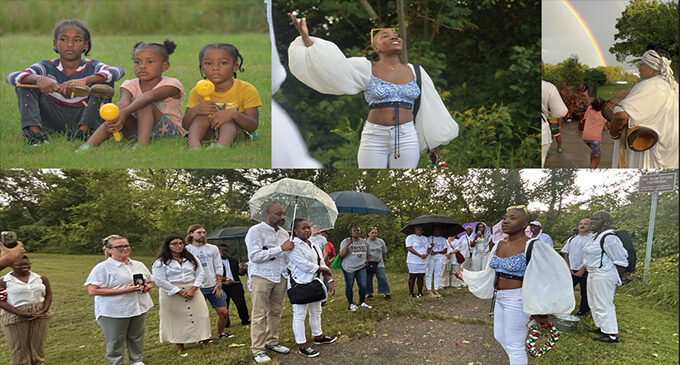The ‘Walking Water’ experience takes walkers, moaners across the Bitting Bridge

By Felecia Piggott-Long, PhD
More than 100 supporters joined Triad Cultural Arts (TCA), Cornerstone Theater and the Happy Hill Community during the week of Sept. 15-19 for a morning walk from the Bitting Bridge in Happy Hill Neighborhood. The walkers progressed silently on the pathway to Happy Hill’s historic Shotgun Houses that are undergoing a transformation. On Friday, Sept. 20, the walks culminated in a gathering to honor the legacy of resilience, liberation, and community that is connected to the newly restored Shotgun Houses.
I gathered with the participants on the Salem side of the Bitting Bridge at 5:30 p.m. The water still flows beneath the bridge and welcomed us all to Happy Hill. On this historic day, we walked the neighborhood, pausing to sing, listen, tell stories, recite poetry, connect with the Happy Hill burial ground, the Happy Hill neighborhood garden, and the intersection of Liberia Street and Free Street before arriving at the Shotgun Houses. There we paused to commemorate the ancestors of Happy Hill through the ritual of libation.
Cheryl Harry, founder of Triad Cultural Arts, and Abrea Armstrong, executive director of TCA, along with their research team, gave birth to the transformation of the Shotgun House Project in Happy Hill. Charlotte Brathwaite and Sunder Ganglani, co-directors of the Cornerstone Theater in Los Angeles, California, conceived of the Walking Water ritual and practice. We all found this historic event to be a powerful, spiritual experience.
“It was definitely a spiritual experience for me, and my soul needed it,” said Arnita “Nai” Porter, who grew up in Winston-Salem, but recently returned to the area after living in Los Angeles for 30 years.
“I saw the invitation online. I was searching for the events in the city. I am so glad I attended,” said Porter. “When Cheryl Harry invited me to sing at the Shotgun Houses, my attention focused on moaning, one of our technologies as people of African descent, especially African Americans. My grandmother would often moan at home. When I asked her why she moaned so much, she said, ‘Sometimes, words just won’t do, chile!’ I never forgot that.”
When Nai began to moan, I responded with rhythms I learned while moaning in the Spiritual Choir at Emmanuel Baptist Church, and singing with the prayer bands around the city at revivals and community gatherings. Nai and I became one throat with two voices. With my djembe drum from Ghana, I could feel the rhythm and the spirit of each movement as we marched back toward the Bitting Bridge. The participants joined in with the moaning and there were no words. We just vibed in the spirit of remembrance.
In my mind, I became a part of the Middle Passage, forced onto ships too small for me to turn; I became a participant in the slave coffle, forced toward the slave castle, entering ‘The Door of No Return.’ I became a worker in the cotton field, a cutter in the sugar cane field, a marcher in Arkansas and in Memphis, singing the freedom songs. We marched and moaned across time and space.
Sunder Ganglani had a spiritual experience during the walk as well. He and Charlotte Brathwaite came up with the term “Walking Water.”
“We wanted to be like water walking through the land. We felt like we were stirring the water. When we planned this, we did not want to tell anyone how to feel. We wanted their own response to ritual. We wanted to create a space, a container for them to call out whatever is inside of them, not dictate what is right or wrong,” said Ganglani.
“When the rainstorm came, everyone accepted the rain as a kind of blessing. The walk kept getting deeper and deeper. I was moved by Felecia’s leadership with the rhythm of the drum,” said Ganglani. “We were humble people in a landscape in the awesomeness of what we can’t quite see. Nobody left when it began to rain. Everybody decided to be present with what could not be seen.”
For Ganglani, the sky opened up when Abre Armstrong recited her original poem “Beach 116” after the group crossed over the bridge. She wrote the poem when she was living in New York in the Rockaways where the numbered streets also designated beaches.
“The sound of the A-Train reminds me how far I am from home. Envying the sandflies and the pelicans for the gift of flight/ On my back I dream and towards heaven, I rise,” Armstrong recited as she lifted her hands toward the sky.
“There was something magical about the rain, the rainbow, and the music. Melanin responds to sound like it does to light, according to science. The combination of sound activating melanin is so pivotal to the Black American experience. Dr. Reagan Patrick Mitchell’s trumpet solo awakened my spirit,” said Armstrong, “The moaning and the freedom songs are a part of our technology to deal with trauma. There was so much embedded in the culture that manifested. As we made the return back to the Bitting Bridge, I heard a blues call and response as a natural way we expressed ourselves. I am still processing what happened. I look for many positive outcomes.”
When we reached the Happy Hill cemetery, I led the group in singing “Gonna Lay Down My Burdens Down by the Riverside.” Rene Andrews told the story of “African Dream” by Eloise Greenfield in the Rising Ebenezer Baptist Church Community Garden. Artist Kayuum Allah shared artwork from the Happy Hill Art Collective. The art included paintings of the Shotgun Houses, a portrait of the Ebonnets Gospel Singers from the Rising Ebenezer Church, and the first African schoolhouse in the area.
Even the children were fascinated with the double rainbow in the clouds. This colored arch is a reminder from God after the great flood of His promise that He would never again destroy the world with water from Genesis 9:9-17. This is the token of the covenant with Noah and with the people and every living creature. No more shall a flood destroy the earth.
Nai Porter can still hear the moaning of the people, and she finds it so beautiful during church services and in nature.
“For me, when I get to the other side of a moan, I know everything is all right. I am in the arms of the ancestors. God is carrying me. I am energized, rested, and I have what I need to carry me through,” Porter said.









